Mexican Sweet Breads (Pan Dulce) + Video
23
Updated Mar 04, 2025, Published Feb 12, 2020
This post may contain affiliate links. Please read our disclosure policy.
This blog post is a bit lengthy, but I wanted to be able to share a guide from A to Z of Mexico’s beloved Pan Dulce (Sweet Bread).
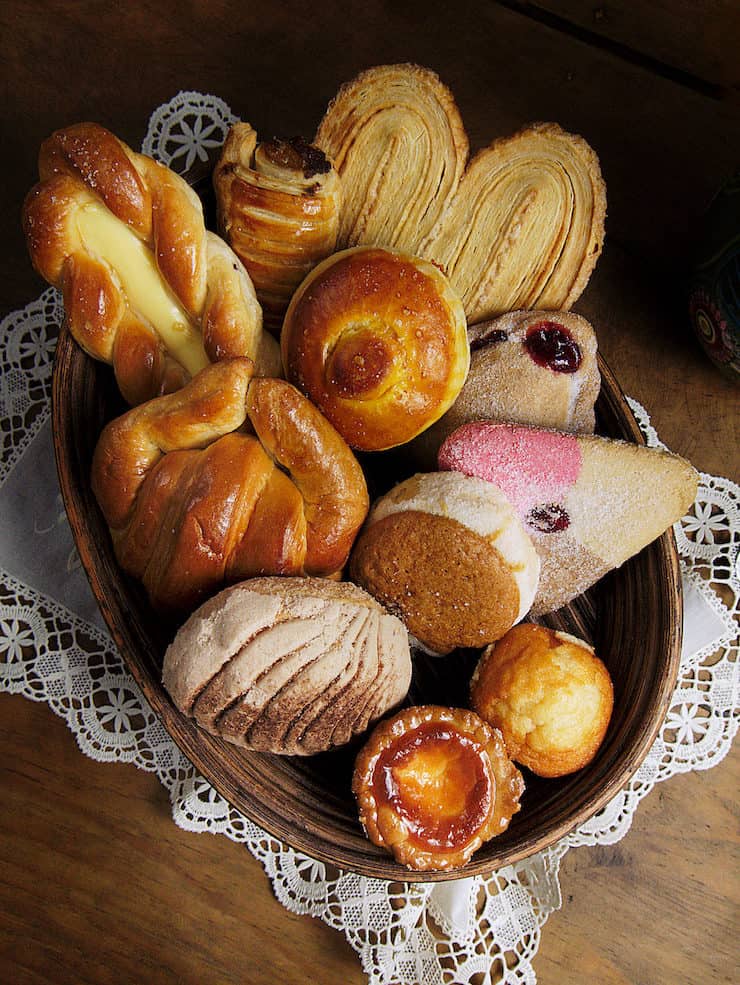
Table of Contents
Homemade Conchas, Sweet Peach Empanadas, and Cinnamon Churro Sticks. Oh My!
I just love the history of food and love learning where things come from and how they are made and named. I am always fascinated when I walk into a panaderia (Mexican bakery) and get hypnotized with the smells of all the pastries, sweet breads, and cookies. I often wonder why they don’t have all of them labeled so I can learn all their names. Some panaderias do, but most do not.
Writing this blog post and seeing all these photos makes me want to learn how to make each and every one of these at home. You might recognize a few — I have linked their recipes if you do not live near a panaderia and get inspired to bake.
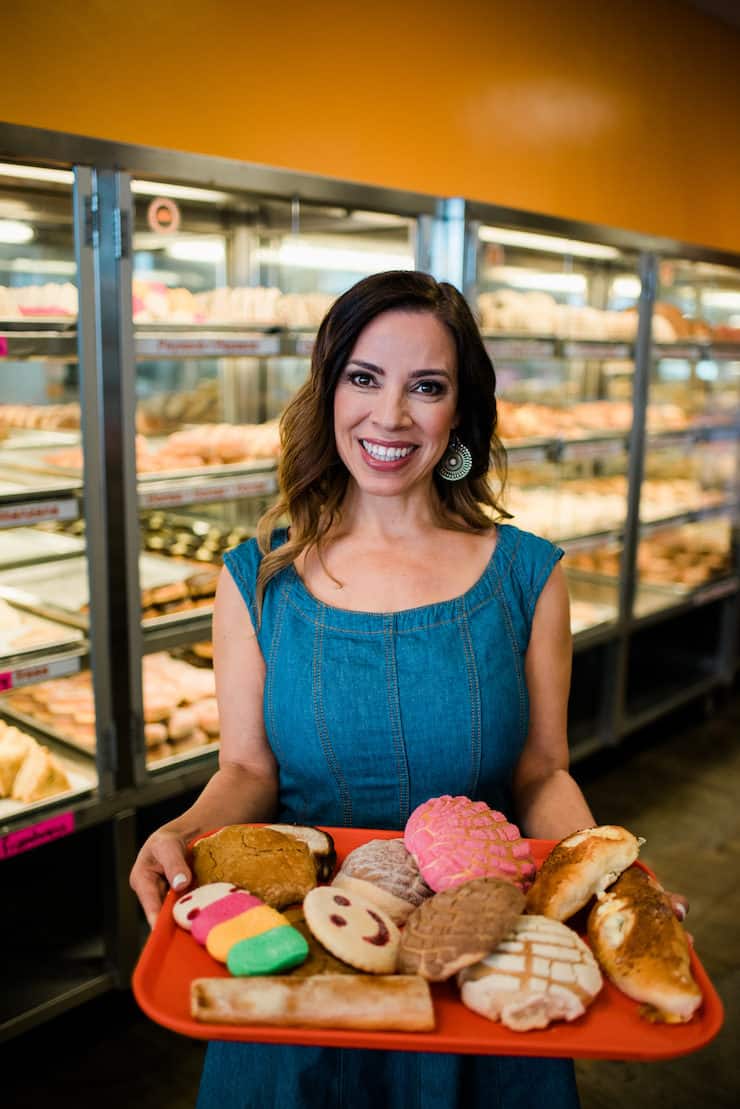
In Pre-Hispanic times the sweets eaten by the native people were nothing like what we now know as pan dulce. When the Spanish arrived, they introduced wheat as well as their countless pastries and baking methods. As time passed the Spanish began incorporating local ingredients to create new versions of their sweet breads. When the French arrived in Mexico they too introduced their pastries and techniques, many which are still alive in modern day Mexico.
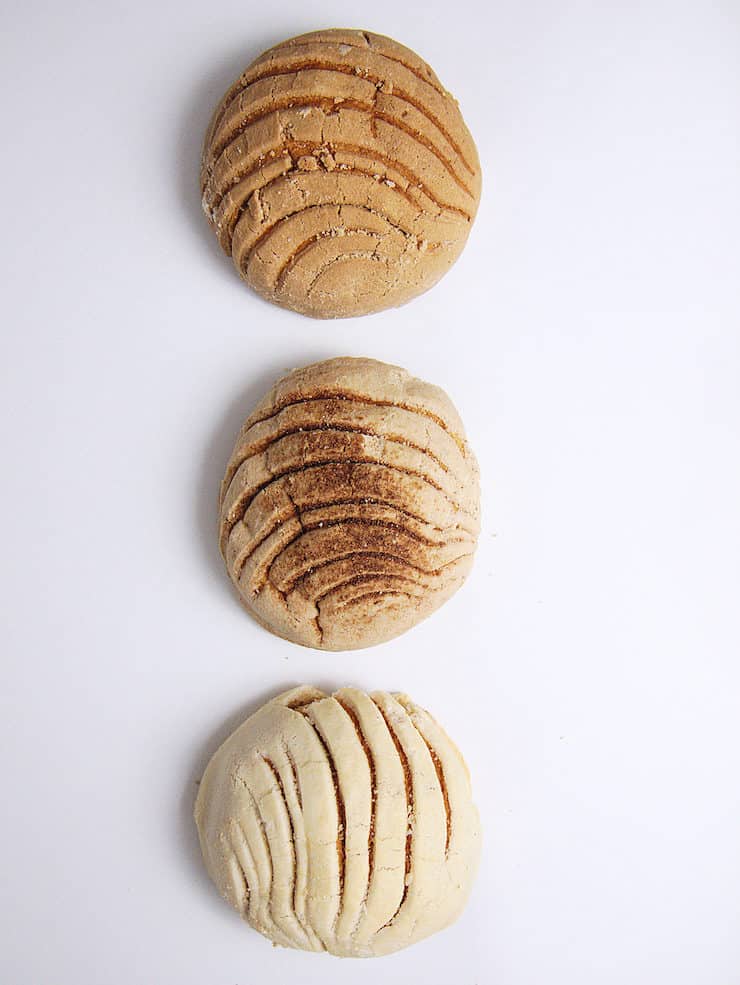
Overtime new breads and pastries were created based on the original Spanish and French ones. The shapes and ingredients have changed slightly, as did some of their names. Many of the pan dulce names are usually a play on words, as is so typical in Mexican Spanish; They can also be in reference to animals, objects, or even people or places.
Each state or Mexican region can differ slightly in their own variations and recipes for making pan dulces. This can be due to the different immigrant groups that populated the region as well as new creations made by local bread artisans.
It’s believed that in all of Mexico there are hundreds and hundreds of different pan dulces — some will go as far as saying there are at least a thousand of them. One would have to visit a bakery in every Mexican state to really see what the actual amount of breads there are. And let’s not forget the pan de feria, those special breads that are only baked for the fairs and only during certain times of the year.
From my own personal research, I found that the variety of pan dulce appear to fall into different groups based on the dough that’s used to prepare them. For example, there are those that are more alike to cake in texture, then the airy brioche bread type, there’s the crumbly textured kind that remind me of American shortcrust pie pastry, and lastly there are those that are made using puff pastry doughs that are either self-rising or aided by the use of yeast. No matter the dough for any of them, they are all delicious in their own right.
The following pan dulces are just some of the ones I found locally. But depending on the bakery you visit in Mexico or the U.S., the breads may differ in name and in their availability.
Are you ready to learn all about pan dulce? Let’s get started! Here is a guide to the most common and regional shapes you’ll find in most panaderias. Scroll down to see a video.
Mexican pan dulce from A to Z
Alamar
Are pretzel shaped breads with a dry crumb which are decorated with coarse white sugar. They are extremely rare to find.
Almejas y Cacahuates
The word almeja means clam and cacahuates means peanuts. This is not like other pan dulce because unlike the other breads this is more like a cookie and instead of a dough needing to be shaped by hand, it’s piped out of a pastry bag to give it its distinct clam or peanut shell shape. The texture is a pillowy soft cross between a spongy bread and a buttery cookie. For either the clam or peanut, two cookies are joined together with a layer of sweetened whipped cream.
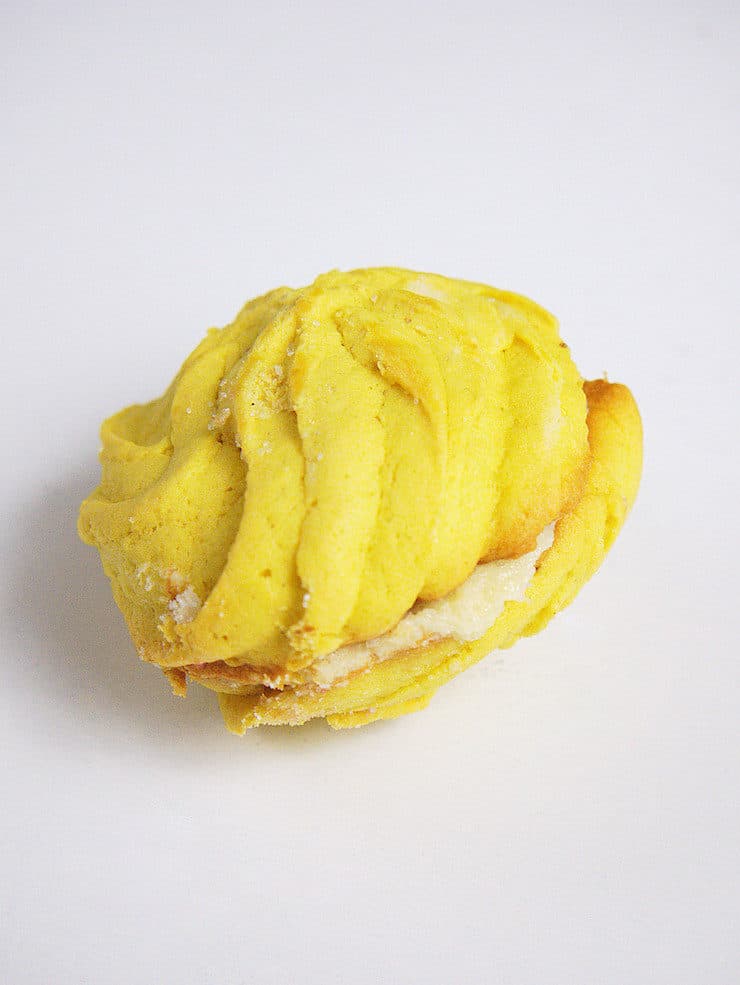
Banderilla
A long, thin bread made of puff pastry dough and coated with sugar. Once baked it rises and has many crispy, flaky layers. The sugar melts and creates a shiny glaze topping. Overall the banderillas aren’t too sweet, it’s only that touch of sugar that gives them their sweetness.
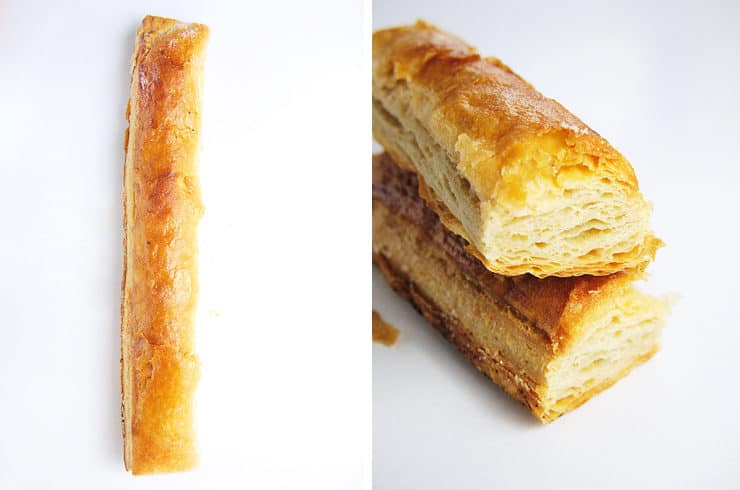
Berlínes or Bolas de Berlín
Are fried donut balls filled with pastry cream or fruit jam filling then coated in sugar.
Besos or Yoyos
Besos are two rounded sweets that are something between a cake and a cookie. They are joined together by a layer of strawberry or apricot jam or crema pastelera (a thick custard like pastry cream), then covered in whipped cream and coated in granulated sugar. The word beso means kiss and are said to be named so because they resemble a kiss.
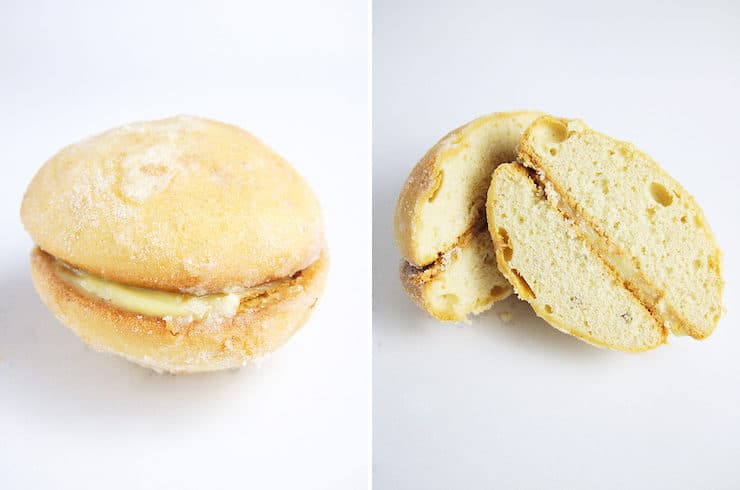
Another name for besos are yoyos (like the kid’s toy) and in some regions, they’ll look just like the description of the besos except they’ll have a raspberry or strawberry jam filling then coated with more jam on the outside before being coated with coconut or granulated sugar (sometimes these are also called duraznos).
Bigote
The word means mustache and this is a bread similar to a cuernito (or croissant), but instead of having a crescent shape it resembles more the shape of a mustache. Typically, these breads are light and airy bread with a granulated sugar toping.
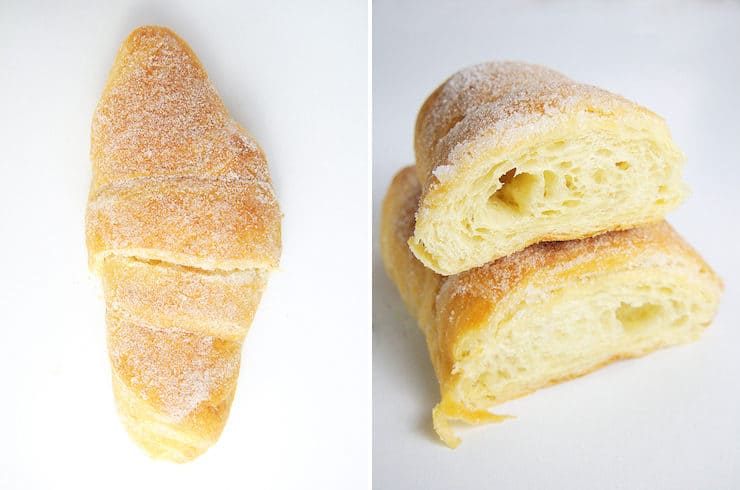
Bisquete
A relative of scones and the American buttermilk biscuit. They’re savory and a little sweet at the same time. They have a texture that is dense, yet flaky round breads are perfect with butter or jam and to enjoy for breakfast with a coffee or hot chocolate.
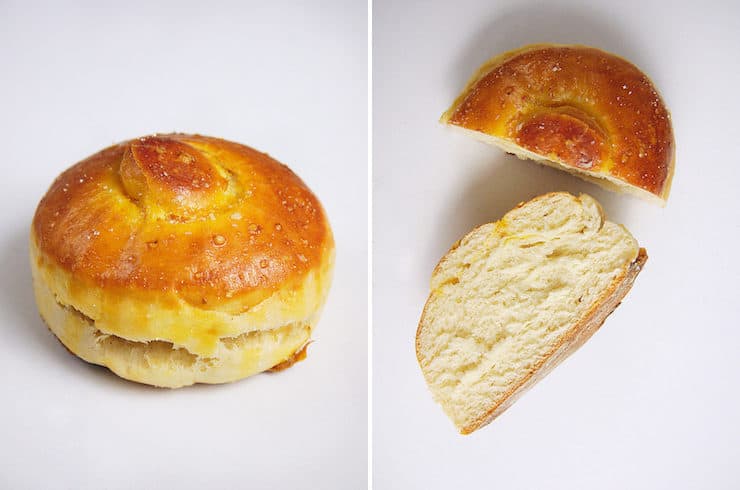
The same dough is used to shape another bread called semáforos, or stop lights. These are a rectangle shape with three circular markings in the center, to resemble a stop light.
Brocas
These twisted puff pastry treats have layer of the same buttery sweet topping of a concha. Additionally, they’re dusted with granulated sugar and may come in chocolate and strawberry flavor. (Brocas sometimes are also listed under pan fino)
Buñuelos (de rodilla & de viento)
Buñuelos de rodilla is fried dough coated in a cinnamon-sugar mixture. The dough is rolled out into a circular shape (much like a flour tortilla). Use this recipe to make Homemade Buñuelos. When when made using a wet pancake-like batter and using a buñuelera (rosette mold), they are called buñuelos de viento. Make them at home using this recipe by Nibbles and Feasts: Buñuelos de Viento.
Campechana
These circular or rectangular shaped pastries are basically pie dough that is baked with a sugar coating, it rises to several crumbly, flaky layers. Once baked the sugar melts to create a shiny glazed.
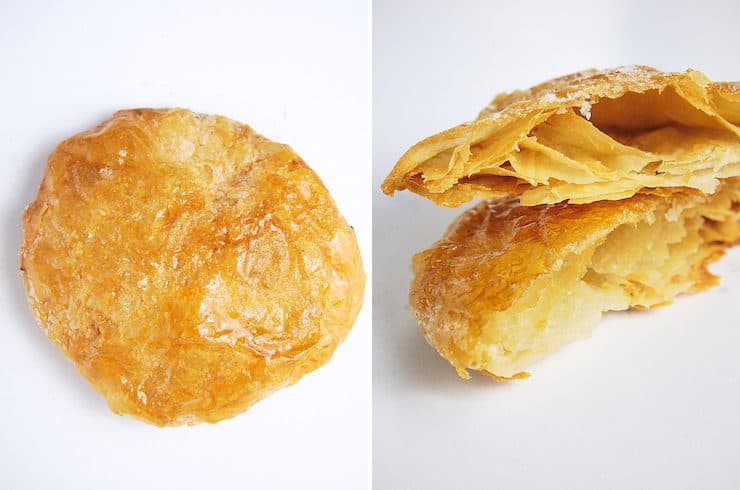
Canasta
This is another Danish-style pastry shaped like a basket (or canasta) and filled sweet creamy custard or crema pastelera.
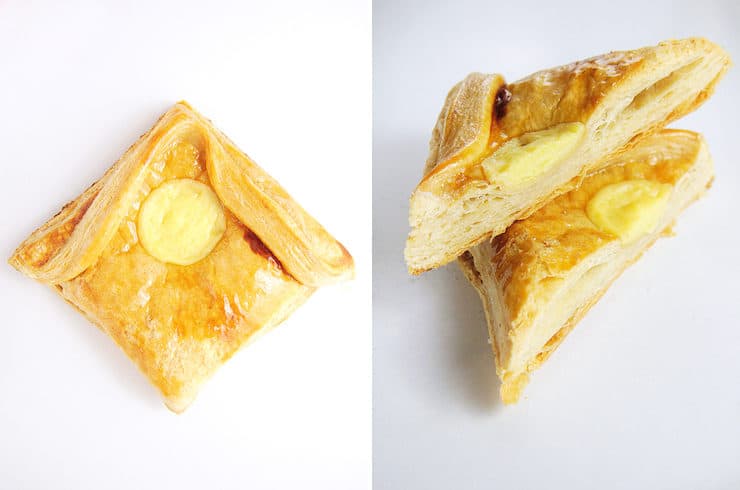
Cemita or Semita
Are basically round sandwich rolls. There are the savory versions and also sweet variety. Depending on the Mexican region the way the sweet ones are made can vary. Ingredients such wheat flour, anise, cinnamon, cloves, piloncillo or sugar may all be used. Additionally, there are sweet versions that include raisins and/or nuts.
Chilindrina
Are similar looking to conchas but also sprinkled with coarse sugar over the buttery sugar coating of the concha. Additionally, no pattern is made on the chilindirnas. In some regions, a chilindrina resembles the beso.
Chinos
Are muffins of all sorts of flavors, some may even have nuts or chocolate or raisins.
Churros
Popular around the world, these choux pastry fried treats are best enjoyed with a cup of hot chocolate. The dough itself isn’t too sweet, but rolling them in cinnamon and sugar makes them even more delicious. Usually they’re hollow inside but may also be stuffed with melted chocolate, cajeta, or even pastry cream (crema pastelera). Make my Homemade Churros to taste the deliciousness!
Cocol
A bread flavored with anise and cinnamon and topped with sesame seeds. It’s believed to be one of the oldest breads of Mexico.
Conchas
The name means shells and are perhaps the most popular of the Mexican pan dulce. This pillowy soft, brioche texture rounded breads are topped with a buttery-sugar flavored coating which typically has a seashell-like pattern. The traditional flavors are vanilla or chocolate but colors can be white, brown, pink, yellow, or a festive color combination. Make them at home using this recipe: Conchas (Mexican Sweet Bread).
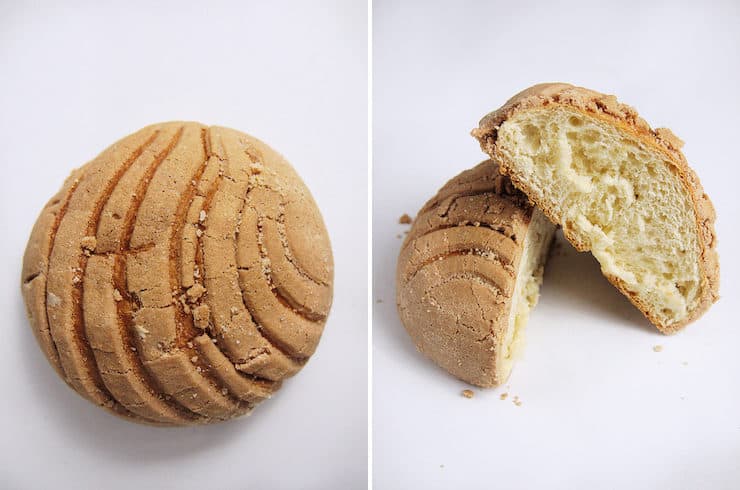
Cono or Corneta(o) or Barquillo
A flaky pastry shaped like a cone stuffed with either crema pastelera or whipped cream.
Cortadillo
The ever-famous square slice of cake topped with a bright pink frosting and sprinkles.
Cubilete
Are small pies that are shaped like muffins. They have a shortbread pie crust and are filled with a sweet cream cheese mixture. No top crust is added, the cubilete is molded, stuffed and baked.
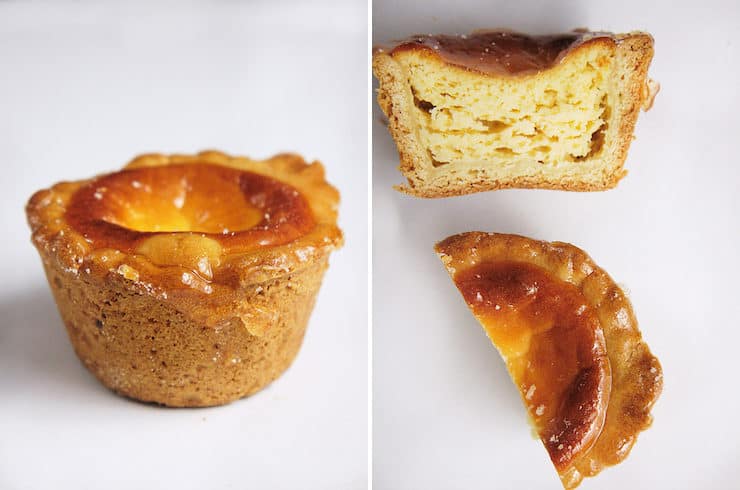
Cuernito or Cuerno
The sibling of the French croissant, tough in Mexico it’s not always the same flaky and intensely buttery dough, cuernitos are another very popular pan dulce. The name means horns and it’s typically an airy bread with an egg wash or if made sweet it can have a glossy sugar coating. Sometimes you’ll also find them stuffed with chocolate.
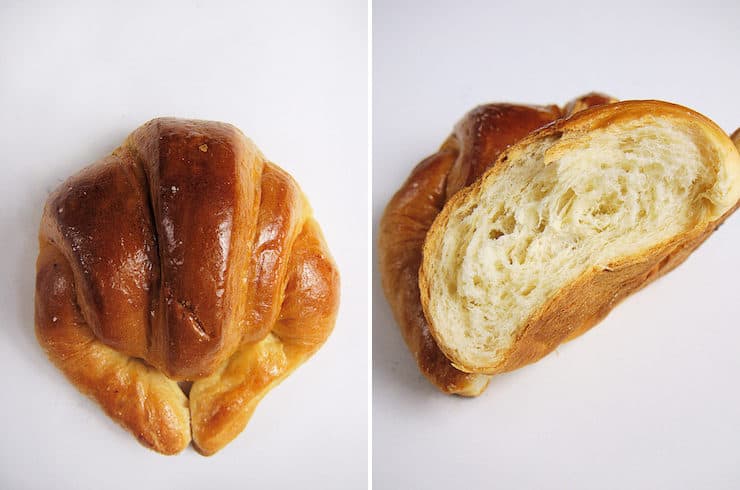
Danesa
Flaky Danish style pastries filled with fruit jam/jelly or crema pastelera. They can be in many different shapes.
Donas
Yes, in Mexico donuts are quite the rage. You’ll find them in all the bakeries, grocery stores, convenient stores, cafes, and restaurants. Mexicans love their donasas much as American love their donuts. The Mexican kind can be found in all the same variations as the American counterpart.
Elotes
Not to be confused with the grilled corn known as elote, these little corn shaped pastries with the texture shortcrust coated with a granulated sugar topping. These are a type of pan fino. Make them at home using this recipe by La Piña en la Cocina: Elotes (Pan Dulce Mexicano).
Empanadas
Popular not only with savory fillings but also sweet fruit ones too. These delicious turnovers come in various flavors like pineapple empanadas, strawberry empanadas, apple empanadas, peach empanadas, pumpkin empanadas, and cajeta empanadas. They can either have the shortcrust dough type or a buttery and flaky pastry dough.
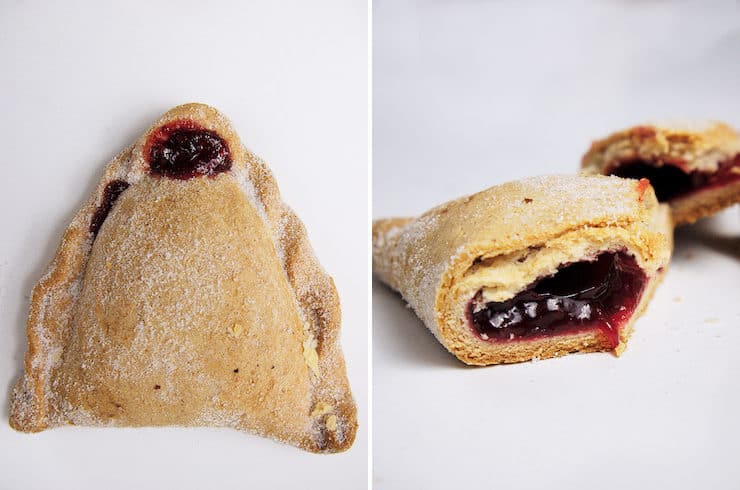
Espejo
Espejo translates to mirror – these two glossy round cookies are topped with either a melted chocolate or white vanilla glaze.
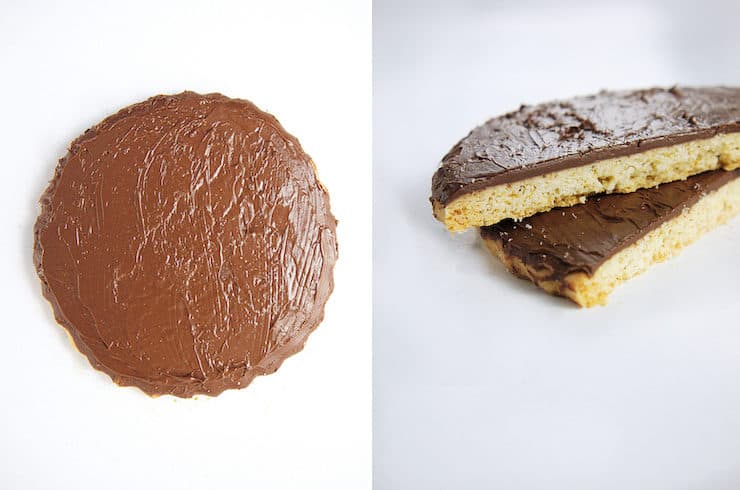
Galletas
Cookies, or galletas, in Mexican bakeries typically refers to shortbread-like cookies that are a bit drier and not overly sweet.
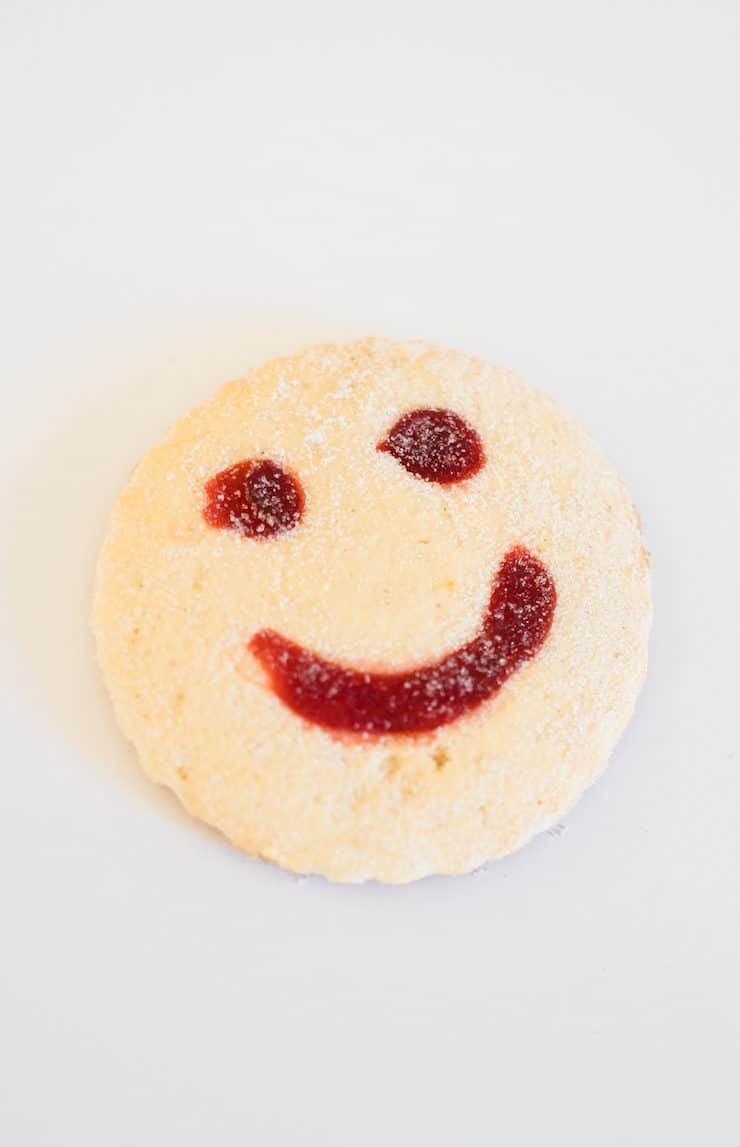
There are countless variations like, galletas de nuez (pecans), some are shaped and colored to resemble a slice of watermelon, there are also galletas caritas (smiley faces), which are my son’s favorite. They are a white cookie but decorated with red gel for eyes and a smiley mouth and sometimes are shaped like a colorful caterpillar.
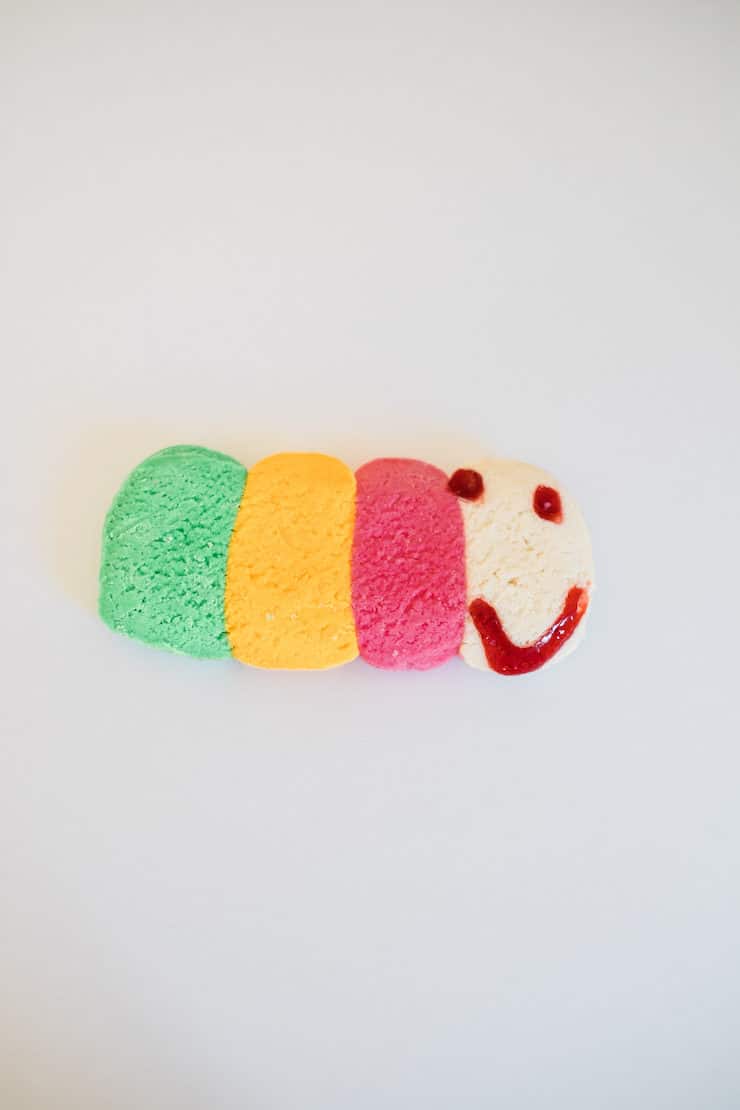
Polvorones are often labeled galletas, essentially, they are all cookies, just different kinds. Make them at home using these recipes: Polvorones (Tri-Color Mexican Cookies), Mexican wedding cookies, and Cuernitos de Nuez.
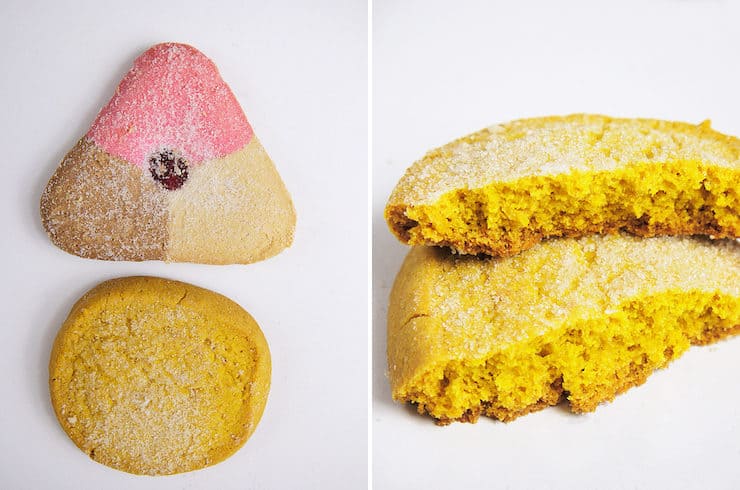
Garibaldis
Small vanilla flavored thimble-shaped pound cakes which after being baked are coated with a warm apricot jam and then completely covered with white sprinkles. The cakes have a very dense texture, though they are still moist and very sweet.
Gendarme
Is the word for a special type of law enforcement officer both in Spanish and French. But when in reference to pan dulce its actually a vanilla flavored crumbly polvoron or shortbread cookie. This odd shaped cookie is a bit moister due to the addition of egg, therefore it doesn’t crumble as easily as a polvoron.
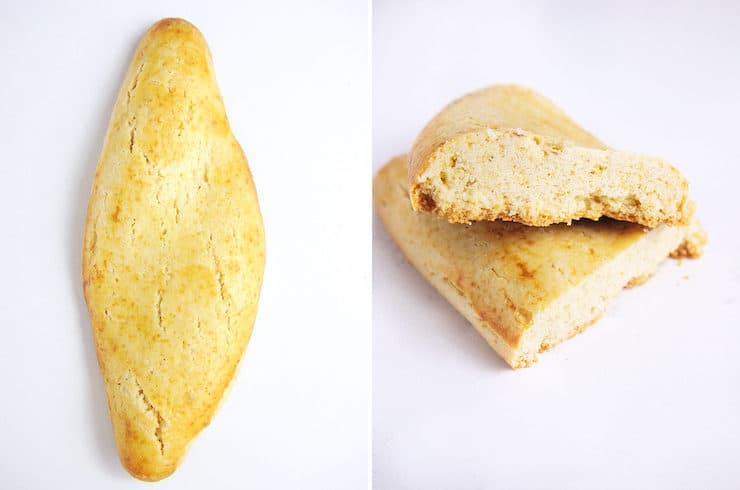
Gragea
A cookie with a similar, yet drier texture than a shortbread cookie. These are sprinkled with a colorful combination of small round shaped sprinkles. Their name means sprinkles or more specifically the nonpareils sprinkle kind. Make them at home using the Mexican Sprinkle Cookies recipe in: Muy Bueno Fiestas.
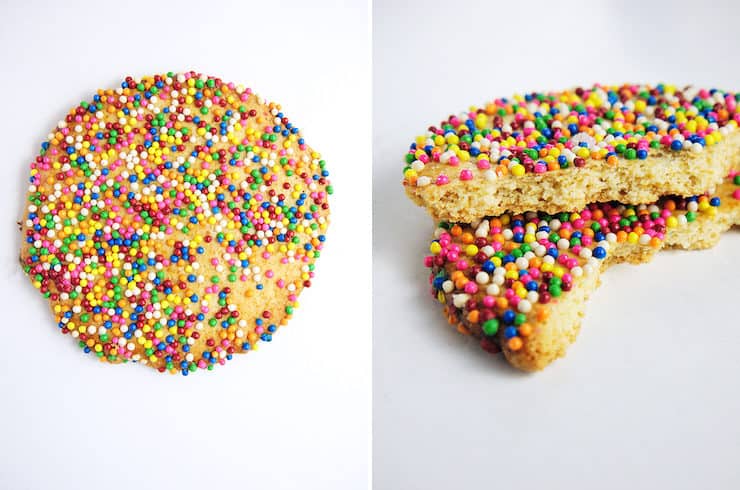
Gusano
The little worm-shaped bread that’s spiced with cinnamon and anise seed, that can vary in the dough that’s used makes it either a crumbly dried dough or a bready almost flaky type bread. Other variations can be in whether the bread is stuffed or not, and if so it can be with a sweet fruit jelly or a custard cream. These are a type of Pan Fino.
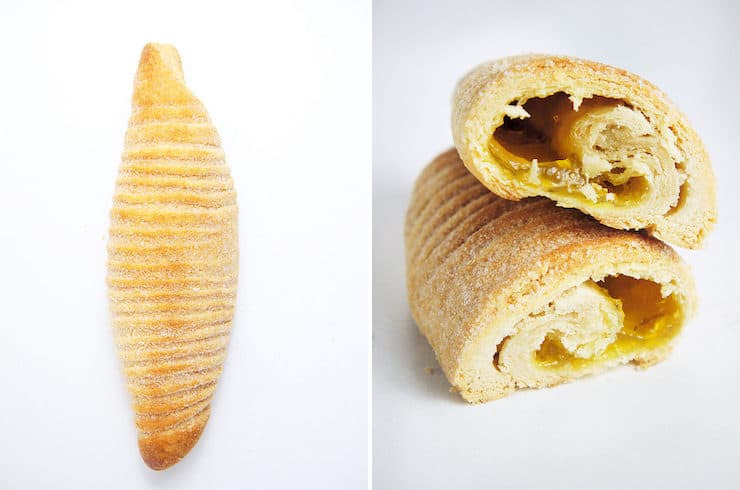
Hojaldras
A round buttery, flaky bread roll that is not very sweet. If you like simple breads without being too sweet this is the pan dulce for you.
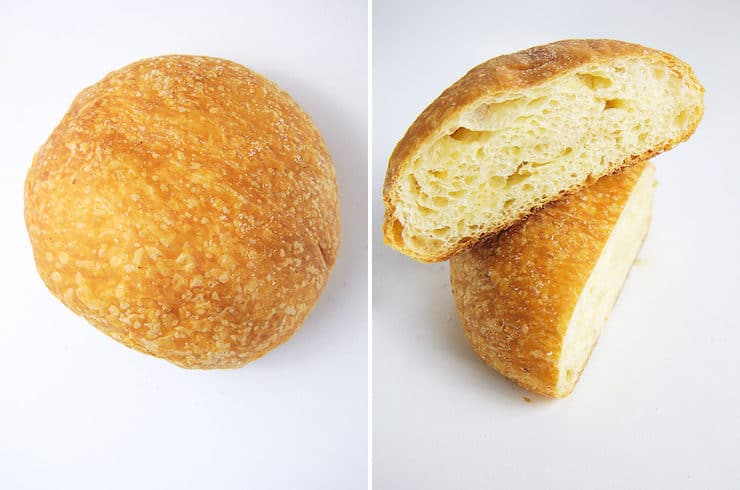
Mantecada or Magdalena
This little muffin shaped breads almost always wrapped in a red paper wrapper are more like a mini pound cake than a muffin. Their texture is buttery and creamy just like pound cake and are always vanilla flavor. A very popular modern twist is mante conchas, which combines the mantecadas with a sugar topping of a concha.
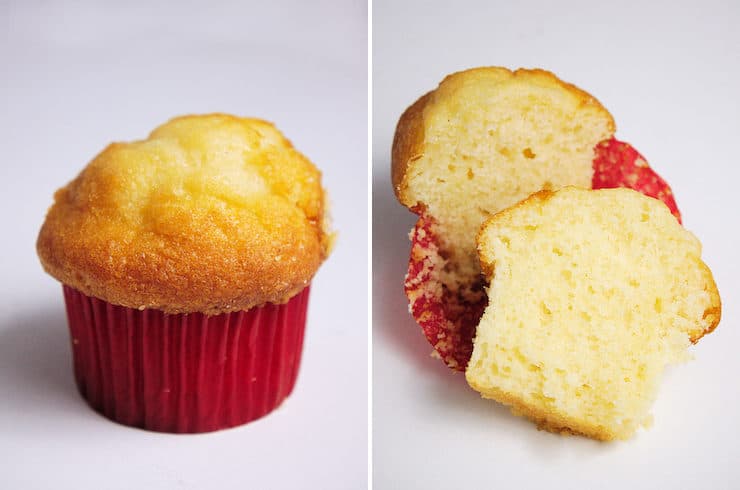
Marranitos, Puerquito, Cochinitos
The beloved pig shaped cookies with a cake-like texture. These brown cookies get their flavor from piloncillo and are the perfect accompaniment to your coffee or hot chocolate. They were my grandmas favorite pan dulce. Make them at home using this recipe: Marranitos (Mexican Pig-Shaped Cookies).
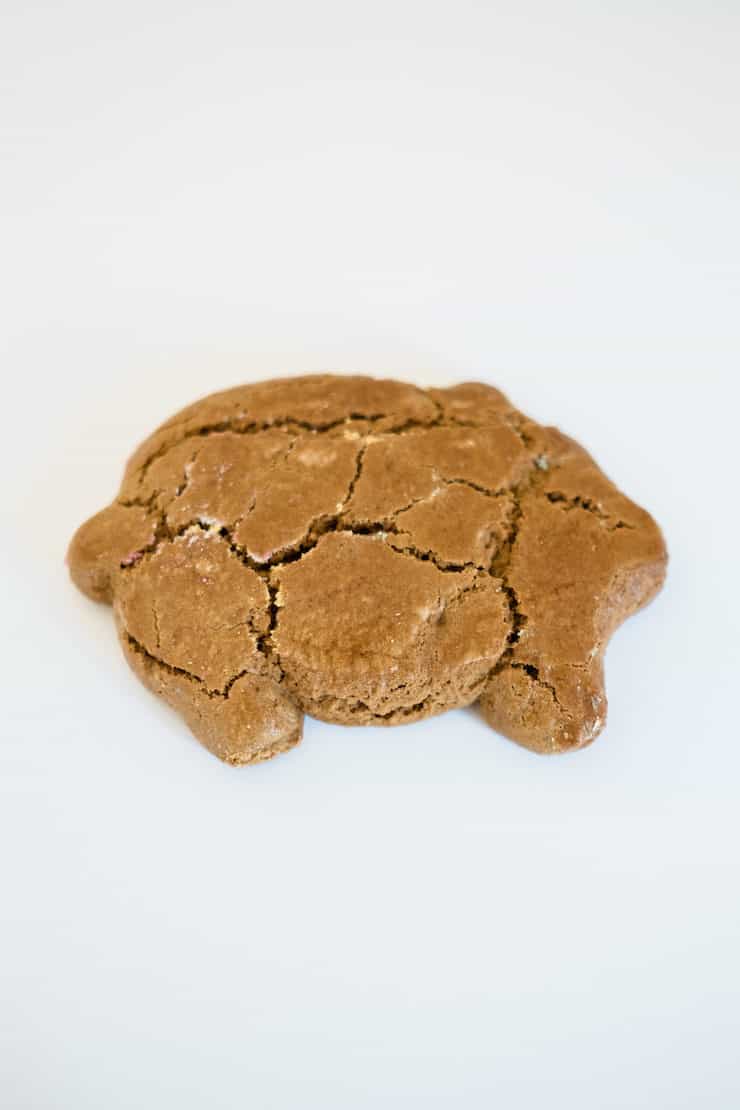
Merengues
You may have guessed it, it’s meringues. They come in all sorts of shapes, colors and sizes.
Moño or Corbatas
Similar in texture to the concha, this brioche type bread is cut into a rectangle before being twisted to resemble a bow, or moño. This bread is coated with granulated sugar. Sometimes these are also referred to as corbatas (bowties).
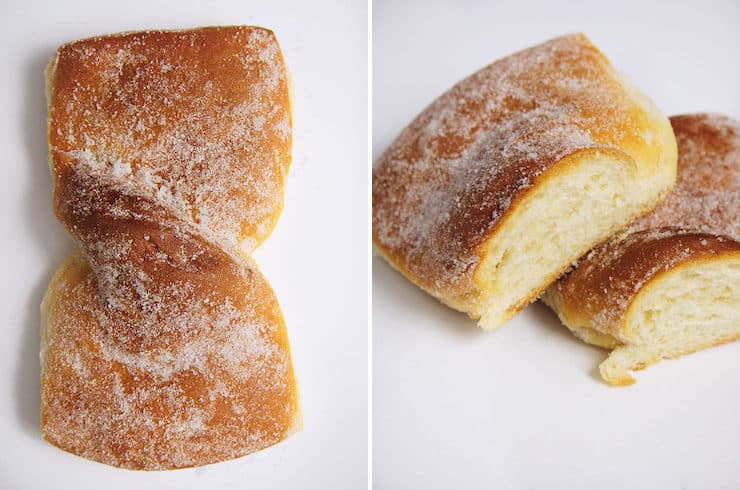
Niño Envuelto
This is a cake similar to a Swiss jelly roll cake. It is stuffed with fruit jelly inside and sometimes on the outside too. The outer part can be coated with shredded and sweetened coconut. A variation is apricot jelly with white frosting of whipped cream on the outside.
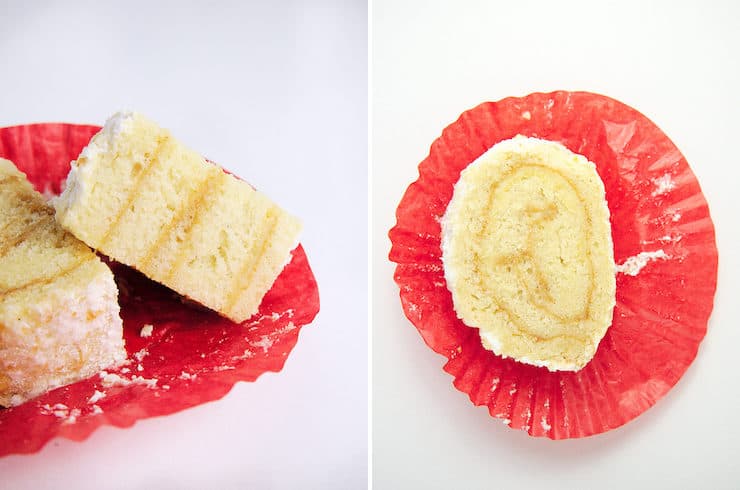
Novia
It is believed to be inspired by a Swedish roll (like a cinnamon roll), and named in Spanish after a bride (novia) and it is said that it was named so because it resembled a bride’s train on a wedding gown. The texture is much like a brioche-type concha, but being a big swirl makes it fun to untwist as you eat. The finished bread is dusted with granulated sugar.
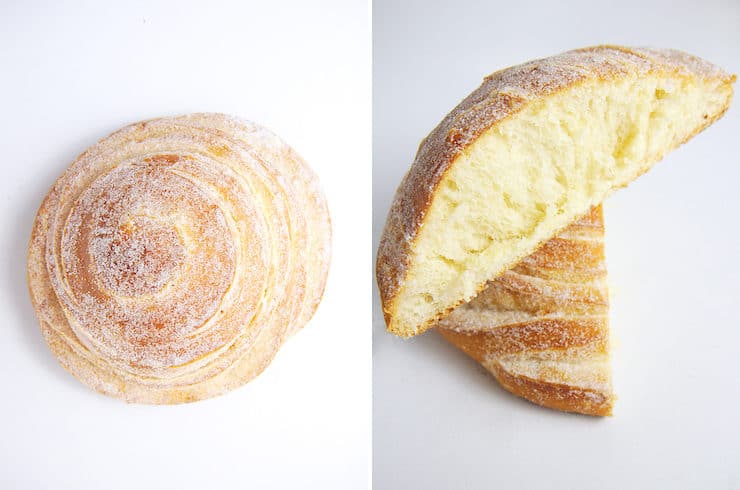
Ojo de Buey
Also known as ojo de pancha in some regions, this bread’s name translates to bull’s eye. In some regions cookies that look more like the besos, but are colored a bright red, are referred to ojo de buey. The outermost layer of the ojo de buey is a sugar-coated puff pastry, this encases a soft and sweet bread with almost a cake-like texture.
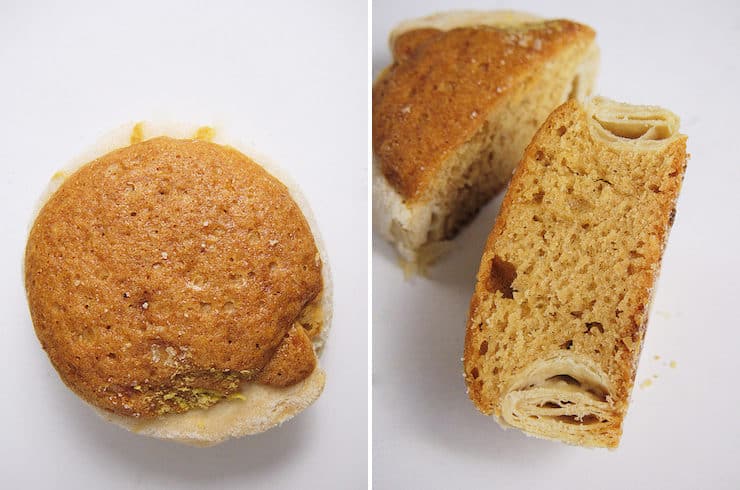
Oreja, Abanico, Manoplas, or Palmeras
Oreja means ear and abanico means fan and manoplas means glove or mitten. This pastry has a flaky pie dough texture and is sometimes simply brushed and dusted with sugar and other times also the ends are dipped into melted chocolate. You may be familiar with French palmiers, that’s what these pastries are. Make them at home using this recipe: Orejitas.
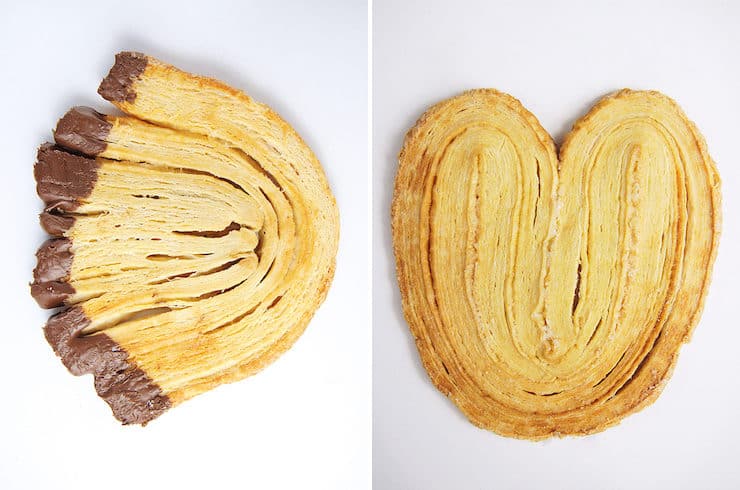
Pan Fino
Can mean two types of bread doughs and countless shapes and sizes. One of the doughs can be similar to the brioche-style conchas, but shaped differently, and also include in one form or another the delicious sugar coating of conchas.
The second dough variation can be a crumbly (short crust type) dough, which too may be shaped into all sorts of things, and also include the buttery sugar coating.
Flavorings for these types of pan dulce may be vanilla, cinnamon and chocolate — and they can often times be mixed together with some breads. Some pan fino breads you may come across are tortugas, cuernos finos, nueces, chamucos, bigotes finos, granadas, mordidas, elotes, gusanos, nevado, brocas.
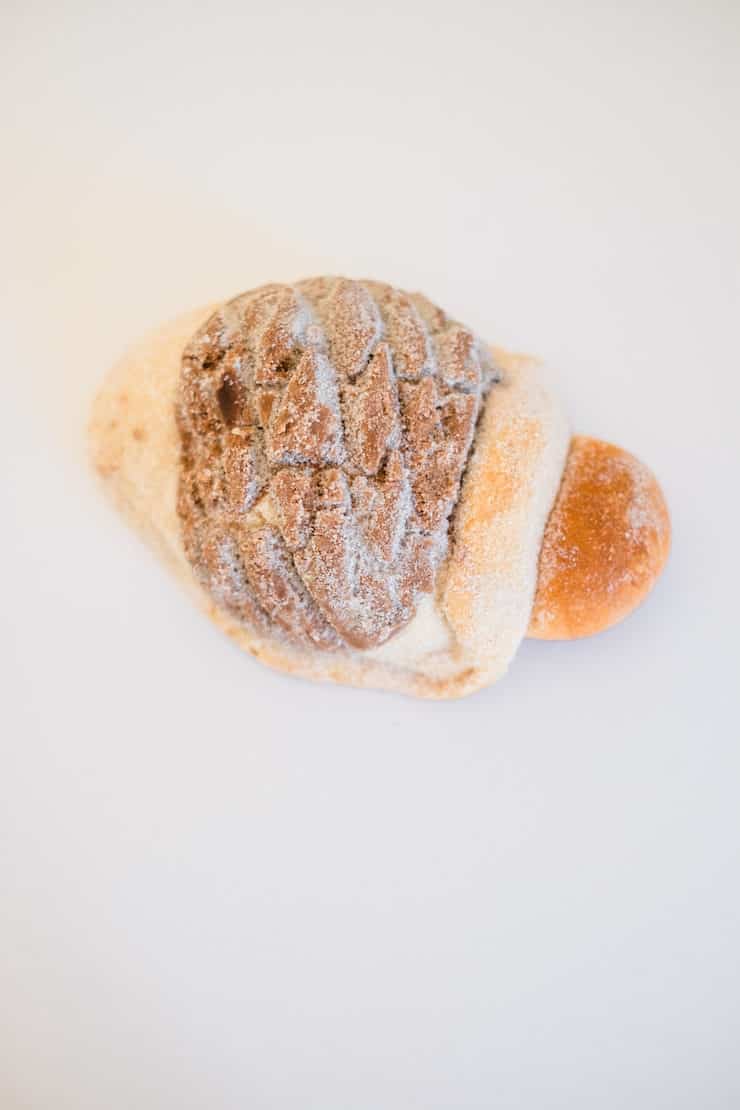
Pan de Muerto
Known as bread of the dead is usually seasonal and made for Dia de Los Muertos celebrations. It is a pan de huevo or brioche type of bread flavored with anise and or orange blossom waters, then dusted with granulated sugar. Make it at home using this recipe: Pan de Muerto (Bread of the Dead).
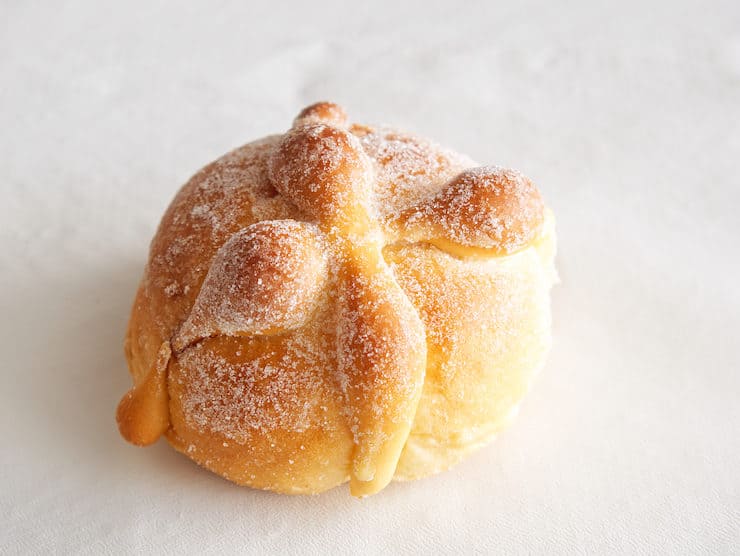
Panquécitos or Panqué
Little pound cake either in muffin shape or different cake like shapes. Tastes just like the pound cake you are already familiar with.
Peinetas
Are fruit jam filled flaky pastry dough pan dulce that’s shaped like a small hair comb, which is actually what the word peineta translates to in English.
Piedraor Ladrillo
Piedra (rock) and ladrillo (brick) have their name because they’re very dry and resemble a rock or brick. The traditional recipe was developed as a way of not letting any bread in bakeries go to waste. This crumbly bread is made using the dry leftover breads from the day before to create a new one. The breads are broken into small pieces and combined with sugar or piloncillo, vanilla, shortening, cinnamon, and milk, before shaping and baking. The last step is in adding sugar glaze or melted chocolate to the top. The texture is much like a dry scone.
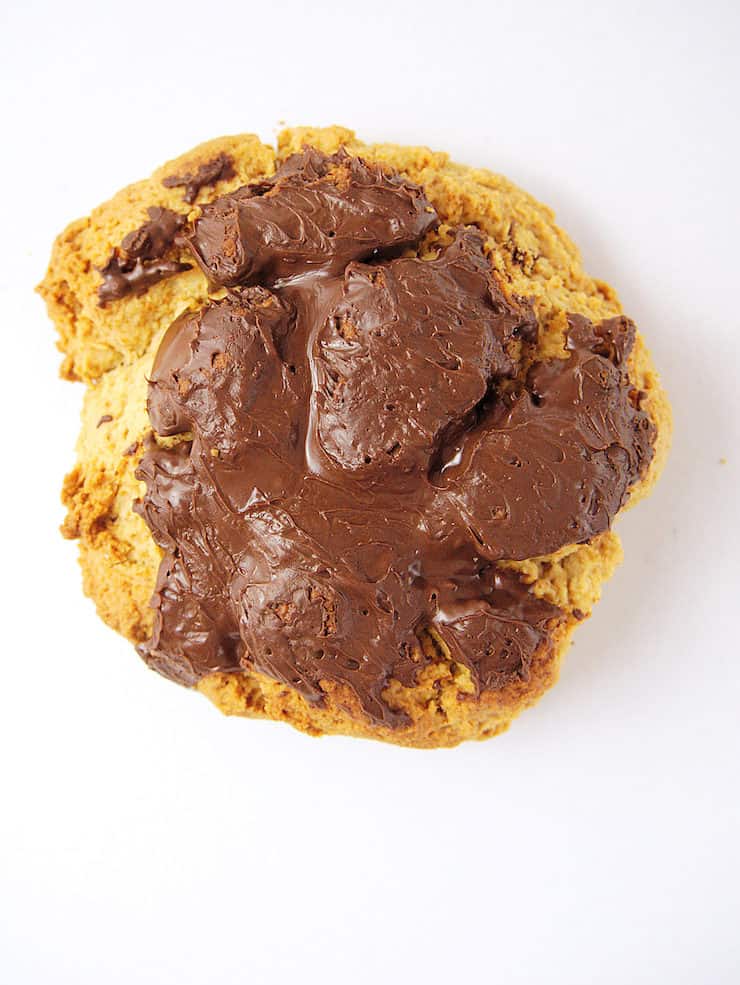
Pinguinos or Pinguis
Meet the Mexican brother of the Hostess Cupcakes. These small cakes are filled with cream and topped with a chocolate coating and swirl of white frosting. They are always present at Mexican panaderias and also in the prepackaged sweets isle at the grocery store.
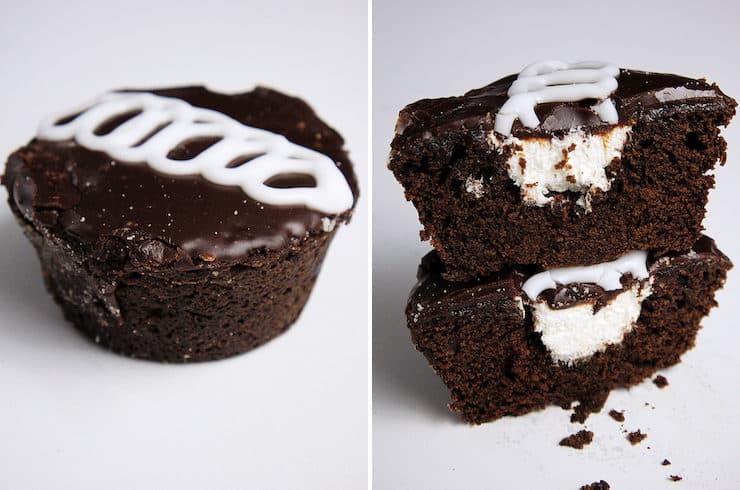
Polvorón
A crumbly shortbread cookie typically with a drier, less buttery consistency than American or European shortbreads. They can be a simple round shape (sencillo) with one color or they can be three (tricolores a.k.a. payasos) or two different colors joined together to create a fun or festive cookie (some of the two-color ones are called sol y sombra). There are also vanilla flavored ones that are either white or pink and coated in powdered sugar, these are called Sevillanos. Some polvorón variations are made with nuts and others with ground peanuts.
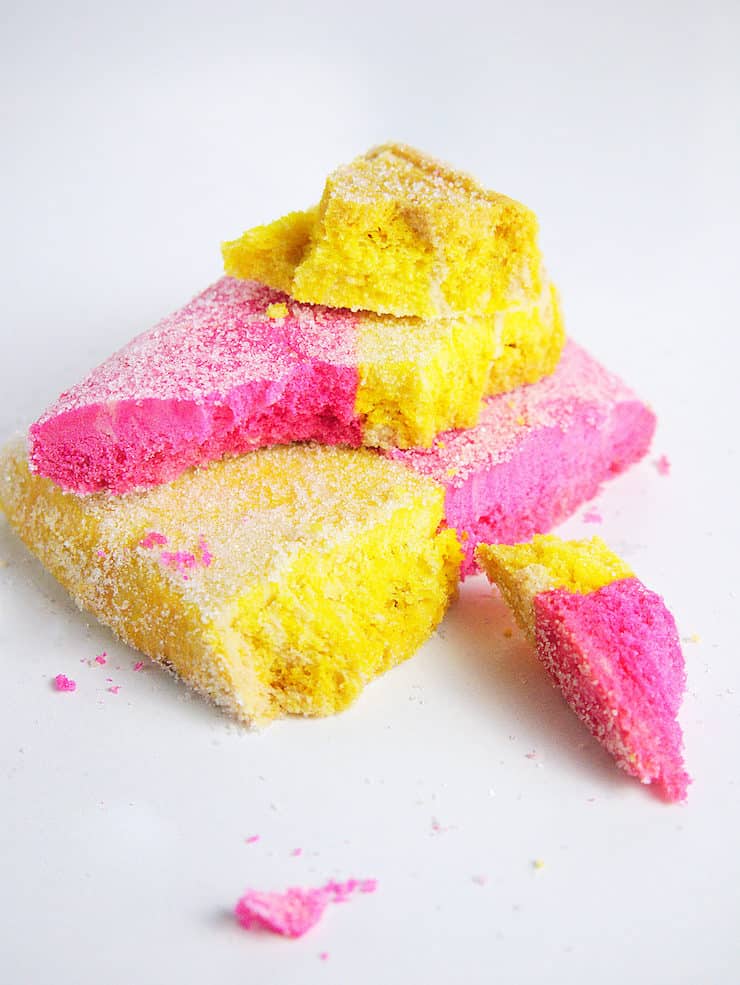
Rebanada de Mantequilla (or simply rebanada) or Lengua
A long slice of bread thoroughly coated with butter then coated with granulated sugar. This is such a simple pan dulce but a very delicious one. In certain regions, this bread may also be known as mantecado.
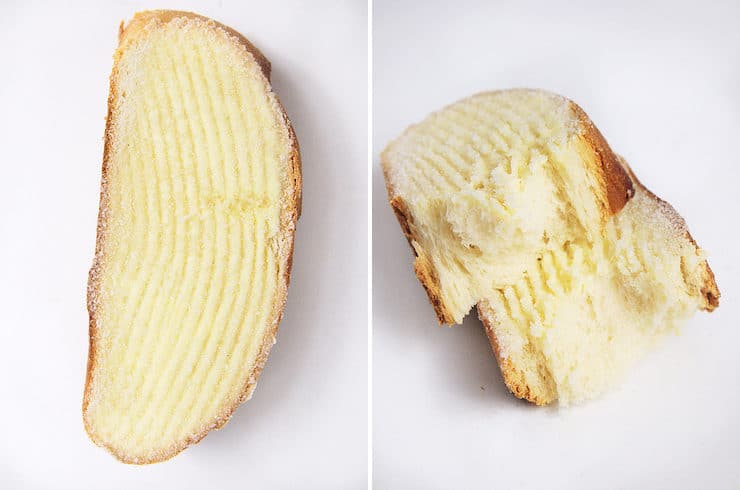
Rehilete
Are star shaped Danish like pastries that have a center filling of either fruit jams or pastry cream. They’re light, airy, crumbly pastries.
Rieles de Fruta
Are rectangle shaped flaky puff pastry treats filled with pineapple or strawberry jam.
Rol de Canela
A round, wreath shaped cookie flavored with cinnamon and coated with granulated sugar. This cookie has a drier consistency and is best enjoyed with a warm drink.
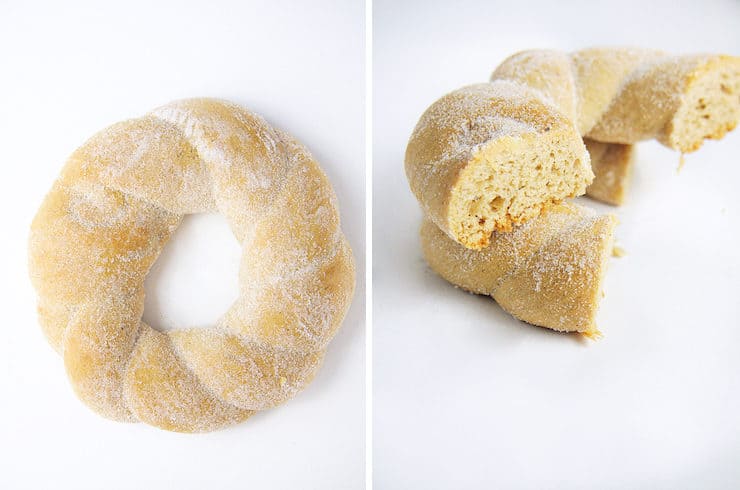
Rosca Apastelada
Is a round bread that’s actually made using puff pastry dough and coated with granulated sugar, which after baking creates a shiny sticky glaze. Make them at home using this recipe by La Piña en la Cocina: Roscas de Canela (Mexican-Style Cinnamon Cookies).
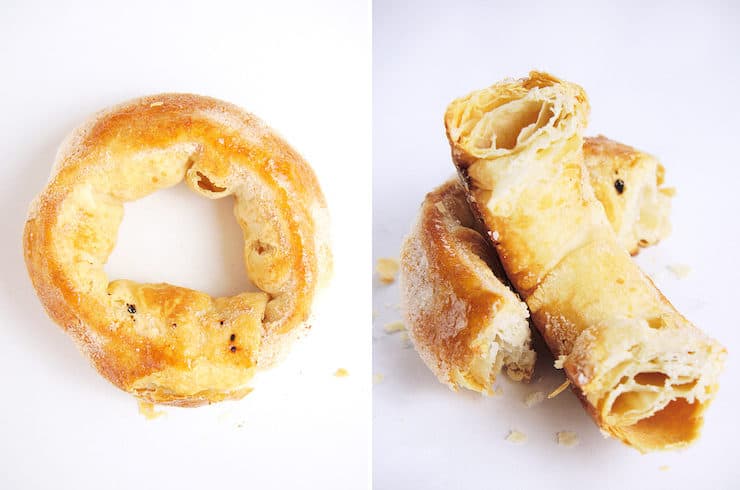
Rosca de Reyes
This round or oblong-shaped bread is a must for the Three Kings Day (or El Día de Reyes Magos). The bread has a brioche-type texture and is topped with candied fruits. Hidden throughout are small baby Jesus figurines of which whomever gets one in their slice, must host the Candlemas Day (Día de la Candelaria) meal. Make it at home using this recipe: Rosca de Reyes (Three Kings Bread).
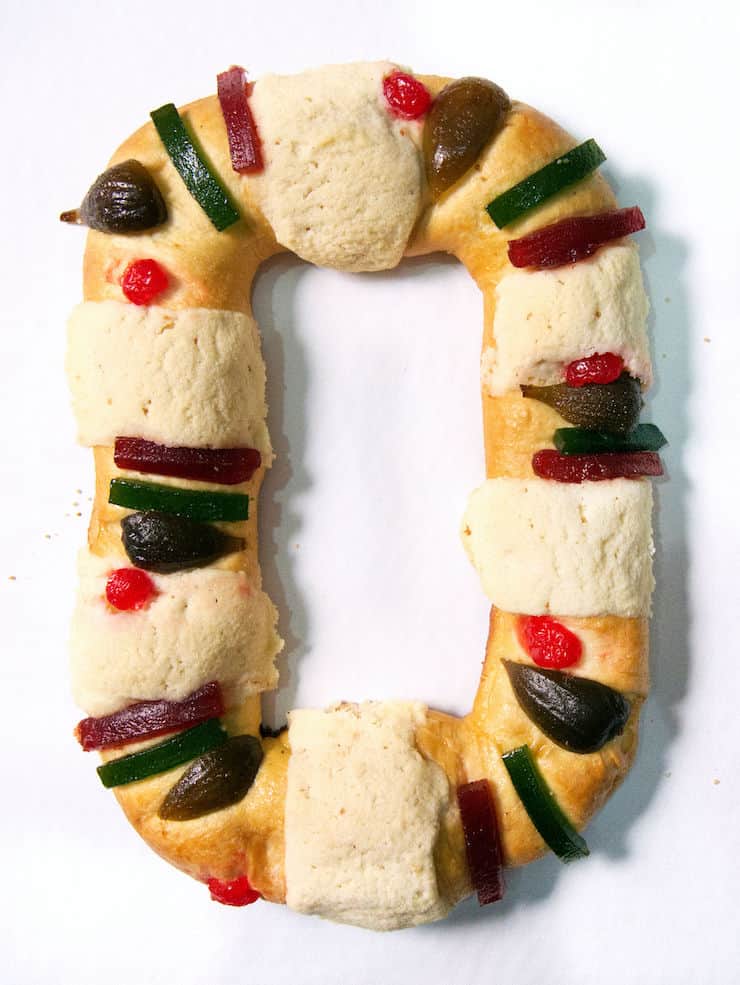
Tacos de Piña
Rolled up puff pastry treats which are stuffed with pineapple jam. They are flaky, buttery, sweet, and make a fun treat to eat.
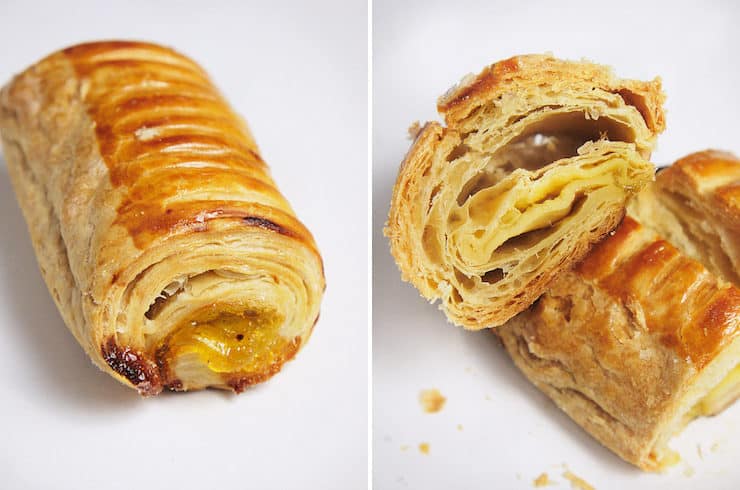
Torcidos de Feite
Are braided puff pastry sticks with a melted sugar coating.
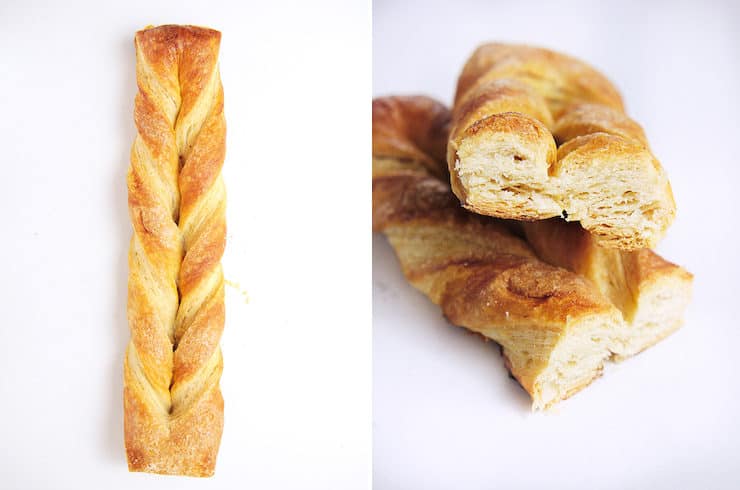
Trenza Danes
A braid shaped bread quite similar to what in America is known as a Danish pastry. The trenza (braid) can filled in the center with a sweet creamy custard or crema pastelara, or sometimes with fruit jam too.
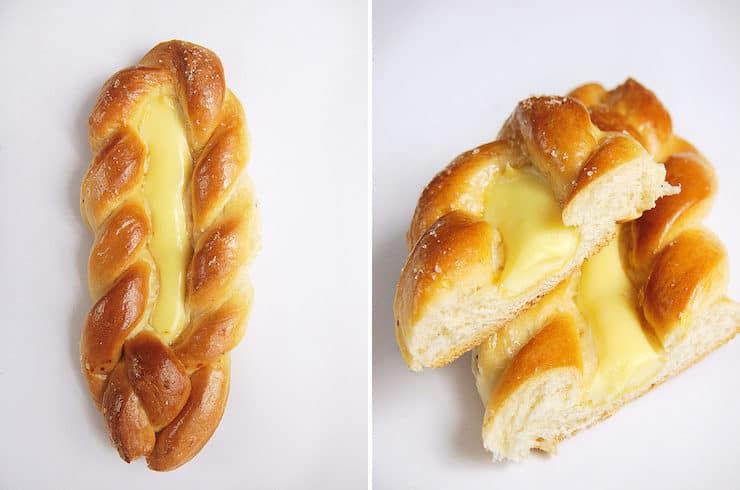
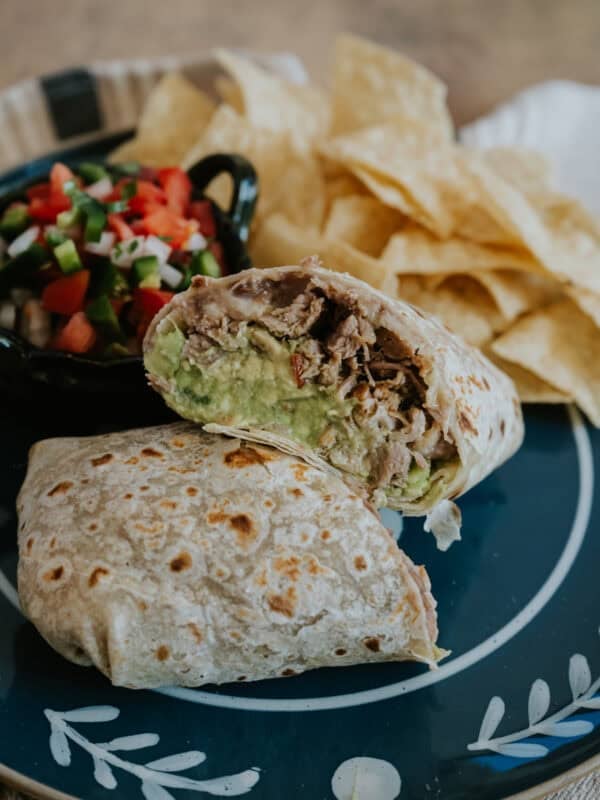
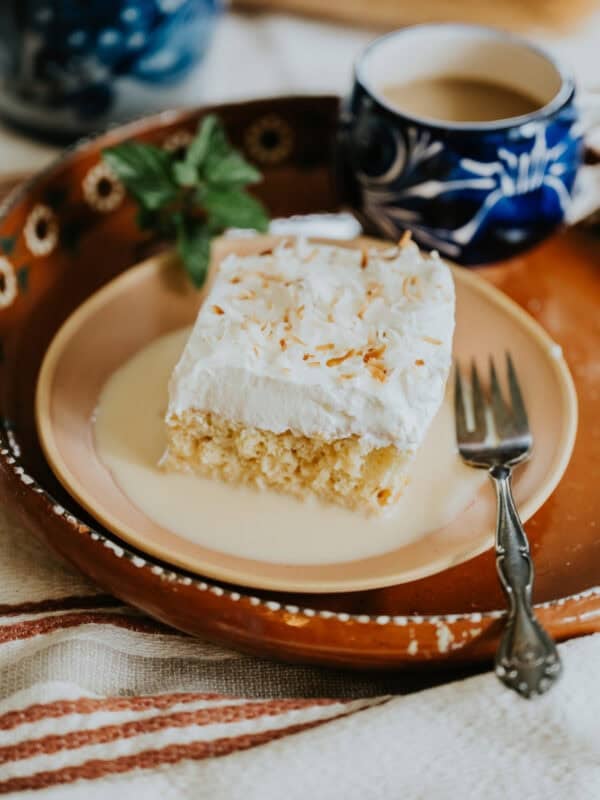
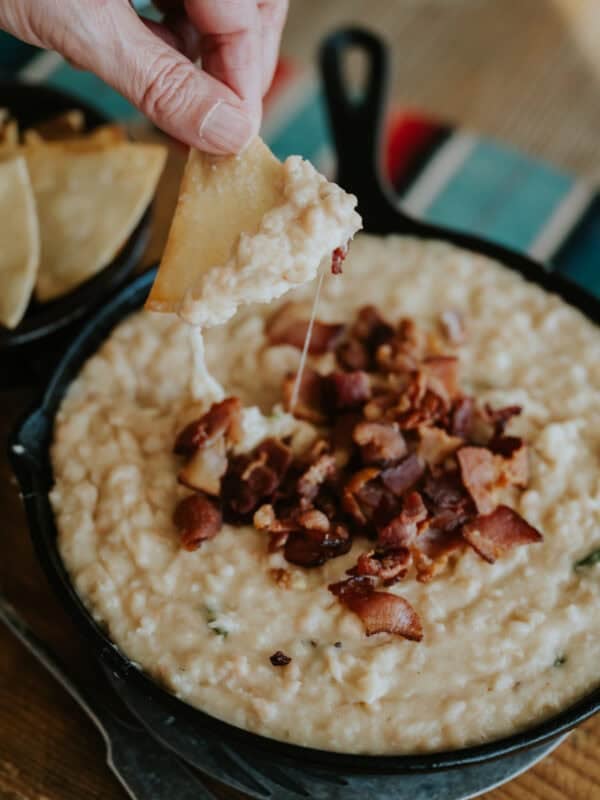
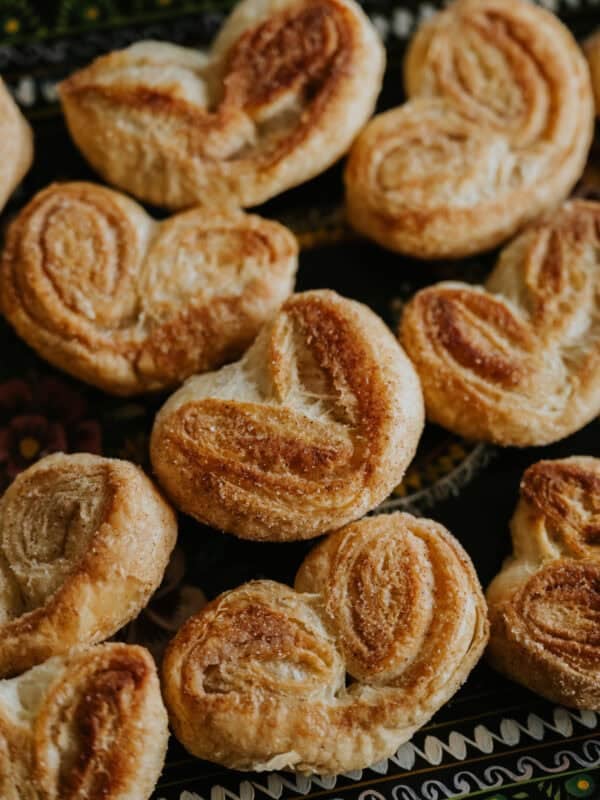









I’m having my concha with coffee as I read your article. I wish you had a recipe for the “ pretzel” cookies. I can find them if I drive across town.
Finishing up a book on Plan Dulce to be published next year. Could you tell me the source for the wonderful foots of the pan dulce. I don’t see credits. Can I use them also. Would really appreciate you assistance.
Fantastic blog! I used to spend 6 weeks a year in Mexico and would seek out baked goods in every town or city and munch all day on whatever appealed to me most from each bakery or food store. I have now learned so much more interesting information about them thanks to this and you. Great job and much appreciated!
good article. Be on the lookout for my new book on Pan Dulce. To be out mid-Spring publication date by Trinity University Press.
I am looing for a Mexican recipe for sweet bread that was flat like a tortilla except it was sweet and so good Wayne.
Maybe this?
https://muybuenoblog.com/bunuelos-mexican-fritters/
I had at one time years ago at and out side dinning area in Mexico and with my meal they gave us some type of very thin bread and it was so good I asked for another of them but I just can’t remember what they called them. Would you know what type of very think type bread I am talking about???
Hello I was wondering if you have recipe for the pink cuernos. I have looked and can’t seem to find one would it e the same recipe for the elites
Thank you for you time
Your pan dulce Mexicano makes me lorn for the pan dulcet of my youth, very wonderful.
Do you have recipe for Piedras you would share with me, also where do I purchase coarse sugar to put on my pan dulce? Gracias.
https://www.mexicoinmykitchen.com/day-old-or-stale-bread/#recipe
My bakery adds anise flavoring to the dough, and a chocolate frosting on top.
I’m looking for a bread called Caracoles. It’s a combination of a Novia, with a little sweet topping like on a concha but has a cream cheese fillling. I can not find anything that comes close to this online. They sale this at the #1 Panaderia in Houston, Texas. Please help me!